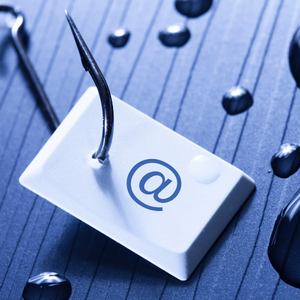Each year, National Cybersecurity Awareness month takes place in October, and in 2021, we shared 4 Tips to Prevent Wire Fraud in Real Estate Transactions on our blog.
But scammers and fraudsters don’t stick to the calendar; we want to take every opportunity to set you up for success when it comes to your home buying journey. That’s why we want to revisit some of the red flags that can help you sleuth out wire fraud.
Wire fraud has become more prevalent in real estate within the past 10 years. It often reared its ugly head when the scammer would send an email to the title company the day after settlement. The scammer would assume the role of the seller from the day before and mention that he had spoken to his accountant. He would claim his accountant told him that the money shouldn’t go to the account mentioned yesterday; then, he would share new account information concerning where the money should go.
This type of wire fraud was directed at the title company and targeted the seller’s money. Scott Mozingo, Managing Attorney of the Manassas office of Highland Title + Escrow, recounts a situation he encountered several years ago. “We received an email from someone stating that the funds from a settlement the day before needed to go to a different place. We were confused by the request and called the seller to confirm. The seller stated that he didn’t send an email, and we discovered it was someone trying to steal his funds.”
Sellers should still be wary of this particular type of fraud, but for the most part, it isn’t as big a concern for this reason: Highland Title + Escrow no longer takes wire or funds distribution instructions over the phone or through email. The risk is too high, and we want to protect your funds. The bad news is that if after settlement the seller does decide to change how or where the funds are to be sent, then they will need to come back into our office to sign new instructions. The good news is that this process helps to protect the seller’s funds from wire fraud. Sellers should make sure that they bring wire instructions or a voided check, which contains the information we need to initiate a wire, to closing. You will sign a proceeds form at closing in our office.
 For buyers, it’s far more complicated. Scammers aren’t targeting the seller or us; they are targeting the buyer directly through a variety of wire fraud schemes. The scammers usually try some sort of phishing exercise by attacking a weak point. Specifically, sending an email that says, “Docs attached; click here,” to an agent or title company and asking the recipient to click on an attachment or document. The recipient will click; nothing will open, but this click has allowed the scammer a way in so he can monitor information passing back and forth between the agent, title company and buyer.
For buyers, it’s far more complicated. Scammers aren’t targeting the seller or us; they are targeting the buyer directly through a variety of wire fraud schemes. The scammers usually try some sort of phishing exercise by attacking a weak point. Specifically, sending an email that says, “Docs attached; click here,” to an agent or title company and asking the recipient to click on an attachment or document. The recipient will click; nothing will open, but this click has allowed the scammer a way in so he can monitor information passing back and forth between the agent, title company and buyer.
As the scammer monitors these emails, he becomes familiar with information related to the agent or company. For example, he has access to emails that contain employee information, business addresses and phone numbers. If attachments are sent with company letterhead or settlement instructions, it’s open season for the scammer to begin assuming the identity of someone connected with the company; he sends emails with slight changes in the company email address. The changes are small enough for the scammer to infiltrate the emails but not so much that the buyer would notice. For example, they may change one letter or number in the email address so the change goes undetected. It will still look like it’s coming from the title company. It’s almost scary how smart these scammers have gotten these days.
As the scammer begins to communicate with the buyer, he is assuming the role of someone related to the transaction so he may know details like how much the buyer needs to bring to closing simply because he has been monitoring emails. The scammer may send an email that mentions something like this: We told you that you needed to wire $20,000. Unfortunately, we must change bank accounts so here is our revised wiring instructions. The new instructions may have the company letterhead and look very similar to prior, legitimate communications but will contain different banking information and a different phone number.
Why is the different phone number important? The scammer won’t want the buyer calling the actual number to the title company or other involved party to verify so he will include a number to be called so that he…or whoever is working with him…can act as whoever’s name is on the instructions, and the scam keeps moving forward.
 Before anyone knows what has happened, the money is gone in minutes, and it is difficult, sometimes impossible, for any funds to be recovered. “This will never happen to me” isn’t a thing anymore. This type of scam is happening every day around the country so we feel we can’t overshare this information.
Before anyone knows what has happened, the money is gone in minutes, and it is difficult, sometimes impossible, for any funds to be recovered. “This will never happen to me” isn’t a thing anymore. This type of scam is happening every day around the country so we feel we can’t overshare this information.
The keys to avoiding wire fraud is using the following tips to scope out red flags:
- Be diligent concerning emails. This isn’t a time for skimming. Read everything you receive from all parties involved in the transaction very carefully. Scammers have gotten really good at portraying themselves as an agent or title professional so carefully look at email addresses and names.
- Be aware of revised instructions. If you receive an email concerning revised wire instructions, be very suspicious. It’s very difficult for us to change banks or account numbers, especially at the last minute. In fact, it normally takes months.
- Call us! Whenever you receive wire instructions, call us at (703) 723-3300 for verification. Anyone at Highland Title + Escrow can verify our wire instructions so it won’t take long. Don’t call the number in the emailed wire instructions unless you are confident it is our number. (You can also stop by any of our 16 locations.)
- Confirm the payee. Money from the buyer should be going to the title company…not a specific person. If an individual’s name is mentioned in the instructions, it’s a big, red flag.
- It doesn’t have to be a wire transfer. If you have concerns about wiring your money, you could always bring a cashier’s/certified check to your closing at Highland Title + Escrow.
- Slow down. A scammer will often try to create a sense of urgency concerning where and when the funds need to be. Funds aren’t due until the day of settlement. We are about treating our customers right so you won’t receive a “Hurry up! We need your money now” notification from us. We also can’t say it enough; call us with any questions or concerns.
- Change your password. If you feel your email account has been compromised, change your password. You can also add an additional level of protection by using two-factor authentication.
Just remember, it’s always worth a confirmation call. If a scammer gets away with your money and it can’t be recovered, you are not only out your settlement funds, you may be in default of the contract you signed. The seller was counting on you to come through so it could cost you more than you realize.
Please contact us at (703) 723-3300 with any questions or concerns, or you can contact us through our website.